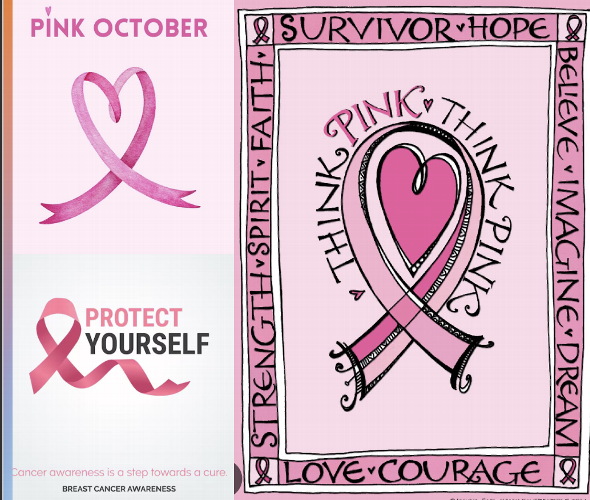October marks Breast Cancer Awareness Month
A time to raise awareness, celebrate survivorship, and highlight the importance of early detection and holistic women's health. While breast cancer is the most common cancer affecting women in the UK, the conversation should extend beyond the breast itself to include how gynaecological and hormonal health intersect with risk, screening, and care.
Why breast cancer awareness matters
Over 55,000 women in the UK are diagnosed with breast cancer each year, accounting for around 15% of all new cancer cases in women. Survival rates have improved significantly thanks to earlier detection, better therapies, and awareness campaigns, yet disparities remain—especially among younger women, those with hereditary risk, or those who face barriers to screening.
Understanding the risk factors empowers women to take preventive action. Risks include : Increasing age, family history (especially BRCA1 or BRCA2 mutations), hormonal exposure, obesity after menopause, alcohol consumption, and lack of physical activity. Reproductive history also plays a role: early onset of periods, late menopause, and not having children can slightly increase lifetime risk, while breastfeeding is protective.
Hormone Replacement Therapy (HRT) and breast cancer risk
Many women experience distressing menopausal symptoms that can severely affect quality of life. HRT remains the most effective treatment for hot flushes, night sweats, mood changes, and vaginal dryness. Understandably, concerns about breast cancer risk have made some women reluctant to seek help. It's important to recognise that HRT is not one-size-fits-all. The risk associated with HRT depends on the type, dose, duration, and timing of therapy:
• Oestrogen-only HRT, used in women who have had a hysterectomy, carries little or no increase in breast cancer risk.
• Combined HRT (oestrogen and progestogen), used when the uterus is intact, is associated with a modest increase in risk that rises with longer use and returns to near baseline within a few years of stopping.
• The absolute increase in risk remains small for most women, particularly when HRT is started around the time of menopause and used for less than five years.
We emphasise individualised, informed discussions, balancing symptom relief, bone and cardiovascular health benefits, and quality of life against small potential risks. Women should not be denied HRT automatically—especially those who are at low baseline risk or those whose symptoms are debilitating. Open, evidence-based conversations between women and their gynaecologists can help ensure safe and effective care.
Screening and early detection
Regular screening remains the cornerstone of early detection. Mammography can detect cancers before they become symptomatic, when treatment is most effective. The NHS Breast Screening Programme invites women aged 50–71 for a mammogram every three years, though those with family history or genetic predisposition may be offered earlier or more frequent screening.
If younger women are keen to have a mammogram before the age of 50 years, they could opt to pay for this privately. Mammography is generally recommended in women from age 40 years onwards in many parts of the world such as the US, Europe and Australia, where it is standard practice. Unfortunately this approach is not currently funded by the NHS.
Whilst mammography has an important role, this does not replace awareness and regular breast examination. Get to grips with what's normal for your body and reporting any changes promptly. A new lump, nipple change, dimpling, redness, or persistent pain should never be ignored.
The intersection of breast and gynaecological health
Gynaecologists play a crucial role in breast cancer prevention and holistic care. Routine gynaecological visits provide an opportunity to discuss family history, hormone use, and screening. For patients with hereditary risk factors such as BRCA mutations, integrated care across breast and gynaecological specialties ensures that both ovarian and breast cancer risks are managed comprehensively. Moreover, women who have undergone breast cancer treatment often experience menopause-related symptoms due to chemotherapy or hormonal therapy.
As gynaecologists we can support these women through non-hormonal management of vaginal dryness, sexual dysfunction, and bone health preservation, ensuring that survivorship care is compassionate and complete.
Turning awareness into action
This Breast Cancer Awareness Month, let's move beyond pink ribbons and take practical steps:
• Stay up to date with screening and encourage others to do the same.
• Be familiar with your normal breast appearance and feel.
• Discuss HRT openly with your healthcare provider—don't suffer in silence.
• Adopt a healthy lifestyle: maintain a healthy weight, stay active, reduce alcohol, and quit smoking.
• Support breast cancer research and advocacy efforts that empower women to make informed choices.
Breast cancer awareness isn't just about one disease—it's part of a larger commitment to women's health, empowerment, and education. By bridging breast and gynaecological care, we can ensure every woman has access to the information, support, and care she deserves. Something which is our key focus here at Gynaecology Care Oxford. Please let us know if we can be of service or help. Take care.


